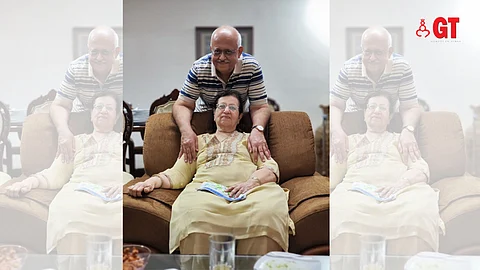

BY MITA ARORA
“There are times when I want to drive my car off a cliff; perhaps that would bring me peace. I’m tired of looking after my mother. I adore her dearly, but I am currently worn out,’ Vikram Vepa, who lives in Betim, Goa, with his 92-year-old mother, said, adding, “I want help.”
He believed he was on the verge of either burnout or a mental collapse. The burden of caring for his ageing mother became too much for him to bear alone when he was 70 years old and single, especially since she refused to accept help from their full-time hired help or nurse.
He sought counselling, and it took him some time to discover coping mechanisms that would enable him to carry on being the honourable son. Others find it to be more complicated.
Maria Monserrate, a 53-year-old longtime resident of Parra, had been caring for her mother-in-law for more than ten years when the latter passed away almost a year ago. It has been difficult for Maria to transition from being a carer to figuring out what to do next.
“I wish that my other in-laws, besides my mother-in-law, could have given me the moral and emotional support I required when I lost my husband ten years ago. At times, I felt utterly helpless, lost, and demotivated. Due to her poor memory, her final year with us was very challenging. It was extremely draining. The house feels deserted now that she has left. While my kids are occupied and employed, I am also looking for work to keep myself occupied. I’m looking for a reason,” she admitted.
Since 2019, Dr Suresh Girglani, who has lived in Goa since 2010 in his Dona Paula home, has been caring for his mother, who is 92 years old. Even though he gets along well with his mother, he finds it difficult to be away from her for longer than a few hours, even with domestic help available.
“My wife was there from 2019 to 2020, and she was a huge help. We separated in 2020, and now that my daughters are adults who live alone without any other family members present physically, I am unable to leave her. Although I am now retired and have the luxury, there are days when I do wish to travel, but she comes first,” he said.
He replied with a smile when asked if he felt stressed about being in his current situation, “I do, but what can I do? I go out with my friends or invite them over, but time is always an issue. Rushing home frequently makes me feel like a contemporary Cinderella.”
For some of the adults in Goa who are attempting to help and be a better carer to their parents, things work by trying to make light of the situation, to be patient and understanding, to try and adjust priorities.
Even so, informal caregiving is more common in India and other South East Asian nations. According to recent studies, 39 per cent of carers exhibit signs of poor mental health; again, this is a late realisation. Carers who have been looking after the elderly or a family member who has a mental illness such as dementia, autism, ADHD, bipolar disorder, among others, are more likely to experience depression, anxiety, and stress.
Carers who have been looking after the elderly or a family member who has a mental illness such as dementia, autism, ADHD, bipolar disorder, among others, are more likely to experience depression, anxiety, and stress.
“We both made the decision to give up our lucrative careers and focus on raising Anmol. We refused to let the news that he was autistic bring us down. Goa has been fortunate. We are fortunate to be able to help him in this way,” said Ritu Shukla, 53, who lives in Old Goa with her son Anmol and partner Dheeraj Shukla.
“We were committed to raising our son well in a time when we hear most marriages failing because one or the other parent doesn’t want the burden or lacks the understanding to help their own child. Look at him now, he is a fine young man,” she added.
Talk to your friends and the people you network with so that the many of us who are or will be carers can create a support system. By sharing, you can live a more fulfilling life and avoid having to deal with the stress alone.
Ritu and Dheeraj have achieved things that not all parents can. When there are financial constraints, the situation is even worse.
“It is crucial to take care of caretakers’ needs. My personal and professional experiences have included working in hospitals, private clinics and even group settings. The carers’ physical, social, and psychological well-being is grossly neglected until an emergency forces them to address it. Even in these situations, when the time comes, the amount of backlog carers must deal with overwhelms them, further discouraging and demoralising them,” according to Mariah Teresa Lobo, a consultant clinical psychologist, Manipal, Goa.
It helps to share your struggles with others. Even though your problems are personal, you can still share them and seek solutions. Talk to your friends and the people you network with so that the many of us who are or will be carers can create a support system. By sharing, you can live a more fulfilling life and avoid having to deal with the stress alone. To ensure, providing for a loved one, is more than a repayment of a childhood gone by.